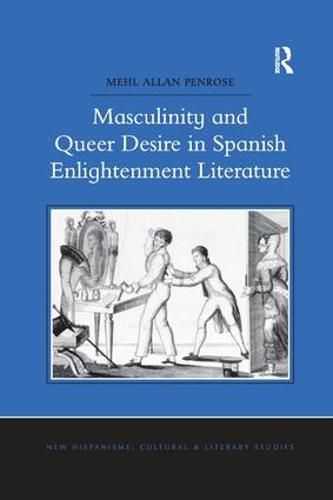Readings Newsletter
Become a Readings Member to make your shopping experience even easier.
Sign in or sign up for free!
You’re not far away from qualifying for FREE standard shipping within Australia
You’ve qualified for FREE standard shipping within Australia
The cart is loading…






In Masculinity and Queer Desire in Spanish Enlightenment Literature, Mehl Allan Penrose examines three distinct male figures, each of which was represented as the Other in eighteenth- and early nineteenth-century Spanish literature. The most common configuration of non-normative men was the petimetre, an effeminate, Francophile male who figured a failed masculinity, a dubious sexuality, and an invasive French cultural presence. Also inscribed within cultural discourse were the bujarrA(3)n or ‘sodomite,’ who participates in sexual relations with men, and the Arcadian shepherd, who expresses his desire for other males and who takes on agency as the voice of homoerotica. Analyzing journalistic essays, poetry, and drama, Penrose shows that Spanish authors employed queer images of men to engage debates about how males should appear, speak, and behave and whom they should love in order to be considered ‘real’ Spaniards. Penrose interrogates works by a wide range of writers, including Luis CaA+/-uelo, RamA(3)n de la Cruz, and Felix MarA a de Samaniego, arguing that the tropes created by these authors solidified the gender and sexual binary and defined and described what a ‘queer’ man was in the Spanish collective imaginary. Masculinity and Queer Desire engages with current cultural, historical, and theoretical scholarship to propose the notion that the idea of queerness in gender and sexuality based on identifiable criteria started in Spain long before the medical concept of the ‘homosexual’ was created around 1870.
$9.00 standard shipping within Australia
FREE standard shipping within Australia for orders over $100.00
Express & International shipping calculated at checkout
In Masculinity and Queer Desire in Spanish Enlightenment Literature, Mehl Allan Penrose examines three distinct male figures, each of which was represented as the Other in eighteenth- and early nineteenth-century Spanish literature. The most common configuration of non-normative men was the petimetre, an effeminate, Francophile male who figured a failed masculinity, a dubious sexuality, and an invasive French cultural presence. Also inscribed within cultural discourse were the bujarrA(3)n or ‘sodomite,’ who participates in sexual relations with men, and the Arcadian shepherd, who expresses his desire for other males and who takes on agency as the voice of homoerotica. Analyzing journalistic essays, poetry, and drama, Penrose shows that Spanish authors employed queer images of men to engage debates about how males should appear, speak, and behave and whom they should love in order to be considered ‘real’ Spaniards. Penrose interrogates works by a wide range of writers, including Luis CaA+/-uelo, RamA(3)n de la Cruz, and Felix MarA a de Samaniego, arguing that the tropes created by these authors solidified the gender and sexual binary and defined and described what a ‘queer’ man was in the Spanish collective imaginary. Masculinity and Queer Desire engages with current cultural, historical, and theoretical scholarship to propose the notion that the idea of queerness in gender and sexuality based on identifiable criteria started in Spain long before the medical concept of the ‘homosexual’ was created around 1870.